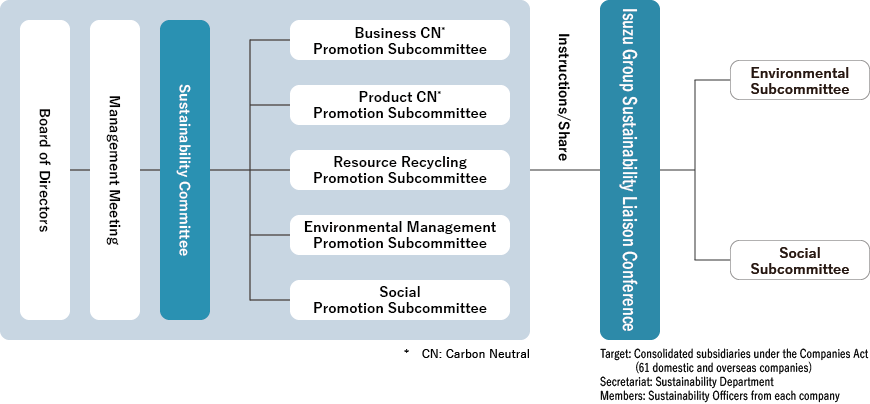- Sustainability TOP
- Promotion of Sustainability
Promotion of Sustainability
Message from the Chairperson of the Sustainability Committee

Director of the Board,
and Managing Executive Officer
The Isuzu Group is promoting sustainability activities to achieve its goal of becoming No. 1 in the four areas of satisfaction, sustainability, employee engagement, and social impact, as set forth in the MISSION Statement of its corporate philosophy, the ISUZU ID.
In ISUZU Transformation―Growth to 2030, the medium-term business plan announced in April 2024, we have set forth a specific vision and path for the Isuzu Group to pursue by 2030, in line with the MISSION Statement.
In fiscal 2025, the Sustainability Committee advanced discussions on the planning and progress of key initiatives, such as carbon-neutral electricity procurement in line with the 2030 Environmental Roadmap and human rights due diligence, thereby strengthening the Group’s ongoing efforts.
Furthermore, in response to evolving trends in sustainability disclosure, we established the Sustainability Disclosure Subcommittee in April 2025 under the Sustainability Committee. This cross-functional body is tasked with information disclosure, helping to further enhance transparency and promote a deeper understanding of the Isuzu Group’s sustainability activities.
Sustainability Promotion System
To promote sustainability throughout the Group, Isuzu has established the Sustainability Committee, which is chaired by a director and comprises officers responsible for each of our business domains serving as standing members.
The Sustainability Committee meets regularly (at least four times annually) to discuss and decide on matters related to sustainability, such as climate change risks and human rights. The matters discussed by the Sustainability Committee are reported to the Management Meeting and the Board of Directors as necessary, depending on their importance.
Under the Sustainability Committee, specialized environmental and social subcommittees have been established to address specific issues. Additionally, in fiscal 2026, we established a new Sustainability Disclosure Subcommittee to improve our information disclosure in light of trends in sustainability information disclosure.
We also hold the Isuzu Group Sustainability Liaison Conference, targeting consolidated subsidiaries, to share information for promoting sustainability activities throughout the Group.

Sustainability Committee Meetings in Fiscal 2025
| Meetings Held | 5 |
|---|---|
| Main Agenda Items |
|
Building Relationships of Trust with Stakeholders
The Isuzu Group fulfills its corporate social responsibility while building relationships of trust through dialogue with stakeholders.

